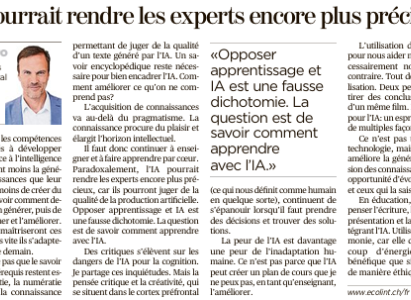This does not mean that knowledge is useless. Certain prerequisites remain essential: literacy, numeracy, and, more delicately, the knowledge required to assess the quality of AI-generated text. Encyclopedic knowledge is still necessary to effectively guide AI. How can one improve something they don’t understand?
Acquiring knowledge goes beyond pragmatism. Knowledge brings joy and broadens intellectual horizons.
Therefore, we must continue to teach and encourage learning by heart. Paradoxically, AI could make experts even more valuable, as they will be able to judge the quality of artificial output. Pitting learning against AI is a false dichotomy. The real question is how to learn with AI.
There are criticisms about AI’s dangers to cognition. I share these concerns, but critical thinking and creativity - which lie in the prefrontal cortex (what, in a way, defines us as human) - continue to flourish when we must make decisions and find solutions. Fear of AI is more a fear of human inadequacy. Just because AI can create a lesson plan doesn’t mean I, as a teacher, can’t improve it.
Using technology to assist us doesn’t necessarily hinder our thinking, on the contrary. It all depends on how it is used. Two people can draw different conclusions from the same film. The same applies to AI: a creative mind will find multiple ways to use it.
This is not a matter of technology, but of mindset. If AI improves the generation and dissemination of knowledge, it will be an opportunity for growth for those who embrace it.
In education, we need to rethink writing, planning, presenting, and researching by integrating AI. Let’s use it sparingly, as it consumes a lot of energy and will only be beneficial if used ethically and thoughtfully.
Conrad Hughes, Director General (article originally published in French in La Tribune de Genève)
AI could make experts even more valuable
It is becoming clear that the key academic skills young people need to develop in the face of Artificial Intelligence (AI) are less about generating knowledge and more about curating it. It’s less about creating content than about knowing how to ask AI to generate it, then reviewing, refining, and improving it. The better students master these skills, the faster they will adapt to tomorrow’s world.

Published
10 July 2025